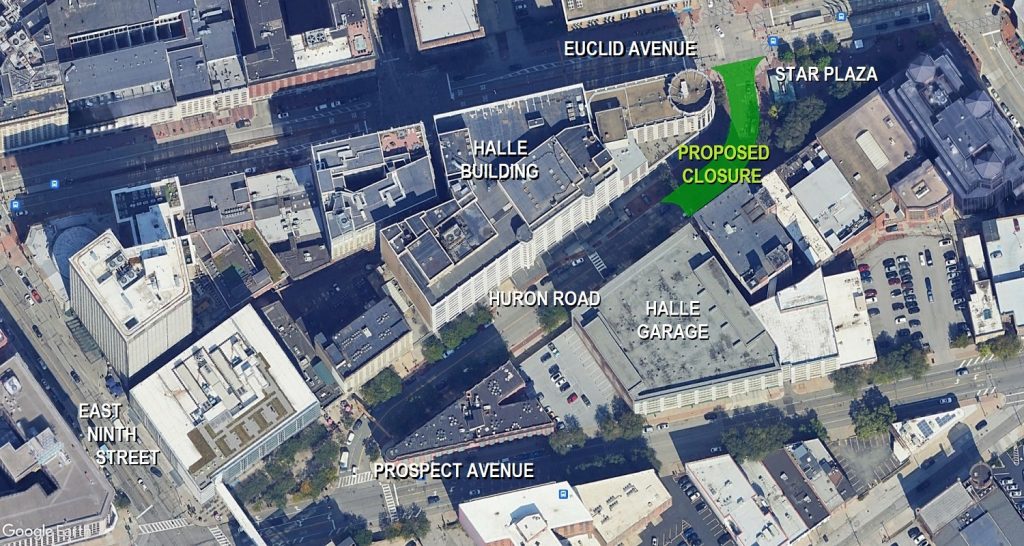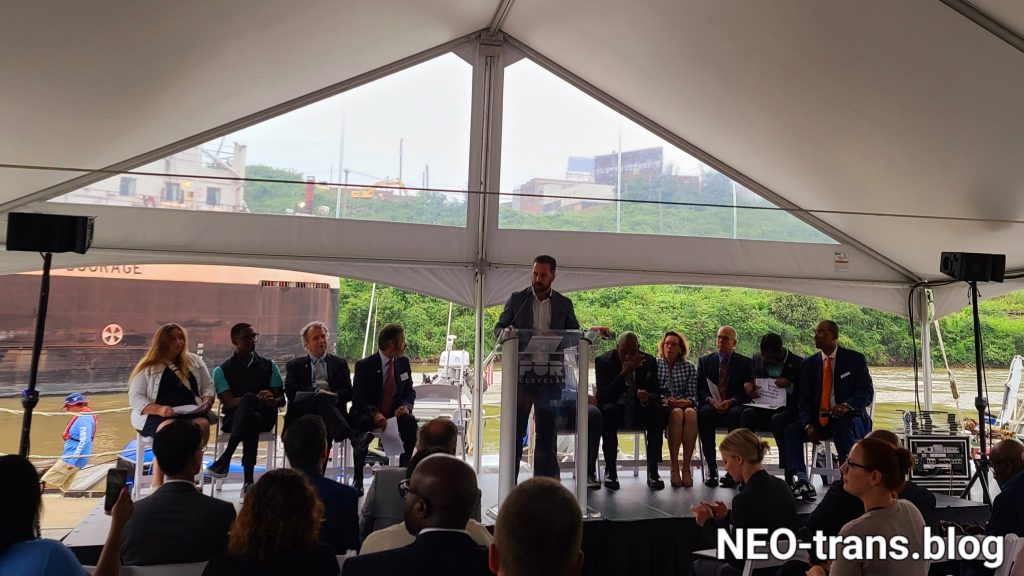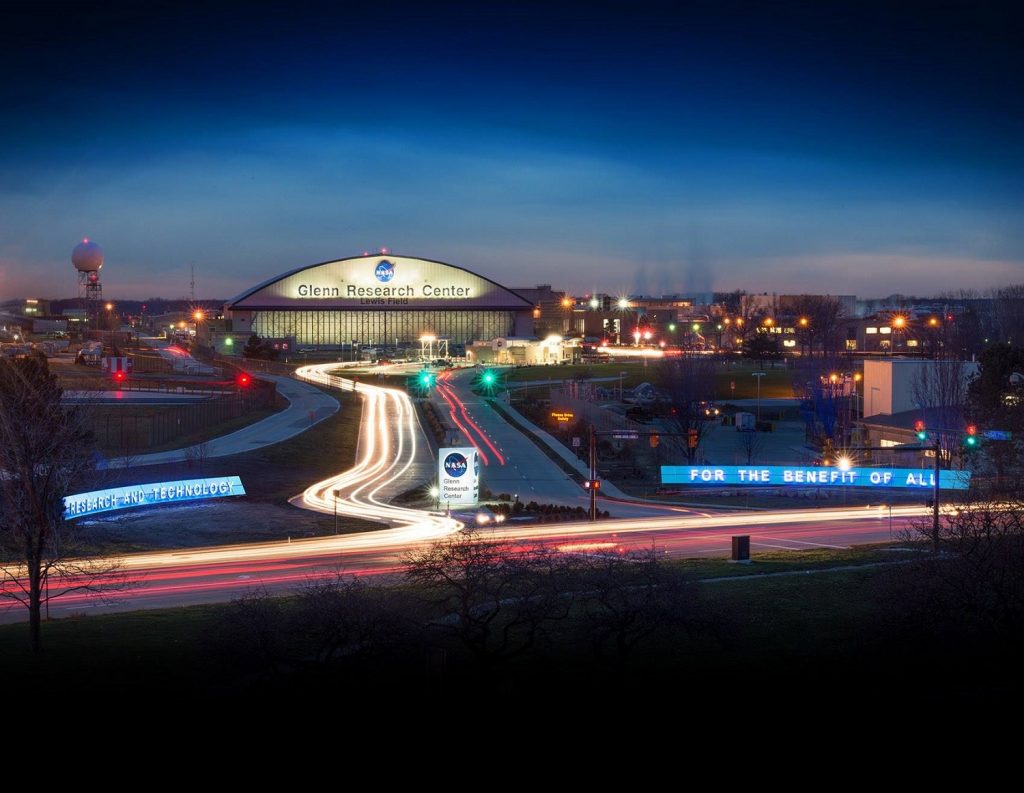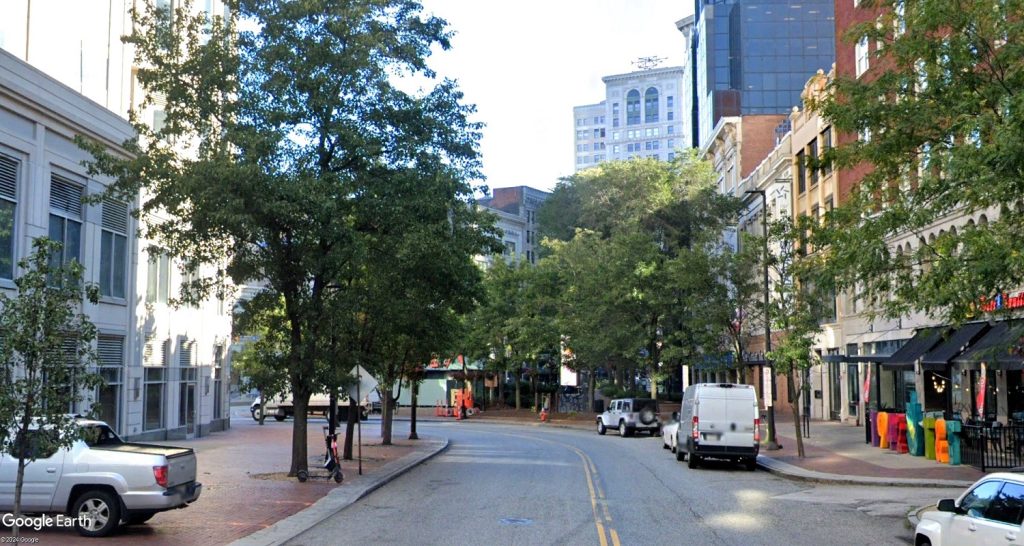
A recent study by Downtown Cleveland Inc. identified Huron Road near Euclid Avenue as one of the best places in the central business district to try to provide a street market of pop-up vendors and artists. The site is between Playhouse Square and the Gateway District sports complexes and has many residential and office buildings nearby (Google). CLICK IMAGES TO ENLARGE THEM.
Site is between Playhouse Square, Gateway

Article updated April 18, 2024
Although early in the process, Playhouse Square Foundation is leading an effort in Downtown Cleveland that could result in the closure of Huron Road to vehicles. The goal is to effectively expand US Bank Plaza and create a venue for a street market of pop-up vendors and artists. The potential closure to cars and trucks could affect a short stretch of Huron that’s closest to Euclid Avenue.
As proposed, vehicular access to/from Huron would primarily be from the west at the Prospect Avenue end, near East 9th Street. When Huron gets to an alley called East 12th Place, cars and trucks might go no further. Huron could continue to be accessible to cars and trucks via service alleys, which are public rights of way but act as service entrances to adjoining buildings.
“We are having some conversations with DCI (Downtown Cleveland Inc.), LAND Studio, the city and other stakeholders to explore possibilities for enlivening the district but nothing has been solidified at this time,” said Cindi Szymanski, communications director at Playhouse Square.
She also noted that a temporary closure of Huron to vehicular traffic will occur in June during the Tri-C JazzFest. During that event, the street will be closed from Zaytoon Lebanese Kitchen, 1150 Huron, to Euclid, she said. The reason why this part of Huron was chosen for a potential permanent closure to accommodate a street market was because of its intimate design and strategic location.
“Huron Road has the bones of a great street — an intimate scale, wide brick sidewalks, mature trees, adjacent public space, and lighter traffic flows — making it well-suited for concentrated creative placemaking concepts and activation,” noted the October 2023 Downtown Cleveland’s Retail Strategy Plan which focuses on placemaking/public realm enhancements.
“Huron is also strategically located between two of downtown’s highest concentrations of both visitors and residents,” the plan continued. “Approximately 5,000 of the
study area’s 12,000 plus residents live within a quarter-mile of the street. Additionally, Huron Road connects Playhouse Square, with 3 million annual visitors, and Rocket Mortgage FieldHouse and Progressive Field, with a combined 7.1 million visitors annually.”
The retail strategic plan specifically identified Huron for a “night market.” The plan also noted that such street markets have increasingly played a role in urban tourism. They offer low barriers to entry for small, often undercapitalized businesses while giving them an opportunity to develop a following that might support moving up to a brick-and-mortar space.
“It’s by no means a done deal, but we’re in the middle of early conversations and engagements to discuss possibilities and ideas here,” said Ian Meadows, DCI’s place programs and social media manager. “If it ends up happening, potentially temporary at first and then permanent, the closure would mainly be from in front of 1942 Tacos & Tequila and stretch up to Euclid, still providing vehicular access to all the garages, loading docks, alleys, etc. that exist along that stretch.”
The retail plan also said that, when curated thoughtfully, street markets can fill a gap in retail offerings beyond food and beverage for casual shopping, leisure and entertainment experience for visitors and residents. The goal would be to create an authentically ‘Cleveland’ experience that helps keep visitors downtown before and after events with a variety of non-food and beverage offerings.
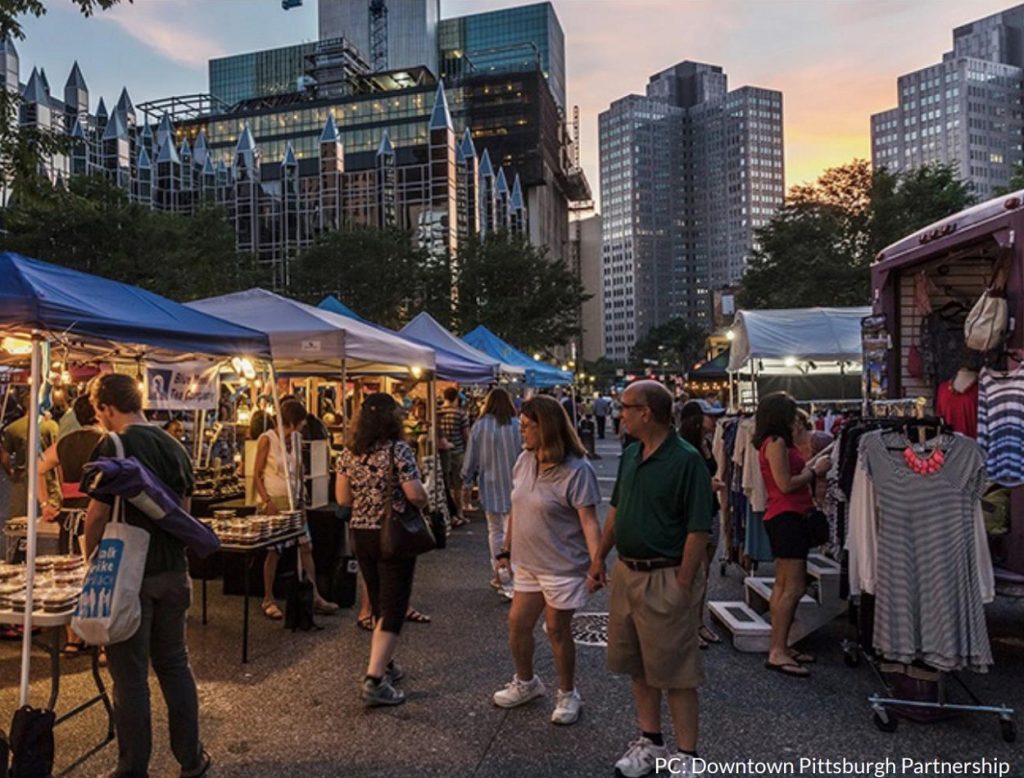
Downtown Pittsburgh has a street market in its Market Square area, offering a pedestrian-oriented venue for vendors who may provide a pop-up kiosk during special events only, during evenings or, if their business grows enough, establishes a brick-and-mortar retail presence downtown (Downtown Pittsburgh Partnership).
A public space on Huron, once prioritized for pedestrians, could be used for additional future programming like a Christmas market, summer night market, extended space for concerts and events, seating, public art and other public activities.
This week, surveys were sent to the owners and/or building managers of properties along Huron. They, in turn, forwarded them to tenants. The properties include several apartment buildings, parking facilities and offices including the headquarters of the Greater Cleveland Partnership, the Cleveland Hospital Association and NRP Group, one of the nation’s largest multifamily developers.
“Having larger plazas and stronger connections between major downtown amenities will catalyze new gathering spots for residents and visitors,” said Greater Cleveland Partnership President & CEO Baiju Shah. “Having larger plazas and stronger connections between major downtown amenities will catalyze new gathering spots for residents and visitors. East 4th Street is a great example of what is possible.”
The survey, provided to NEOtrans by a resident of the Halle Building who requested anonymity, begins with “(stakeholders are) planning on closing Huron Road at Euclid and making Huron an entrance only from Prospect Road and we are hoping to get your thoughts.”
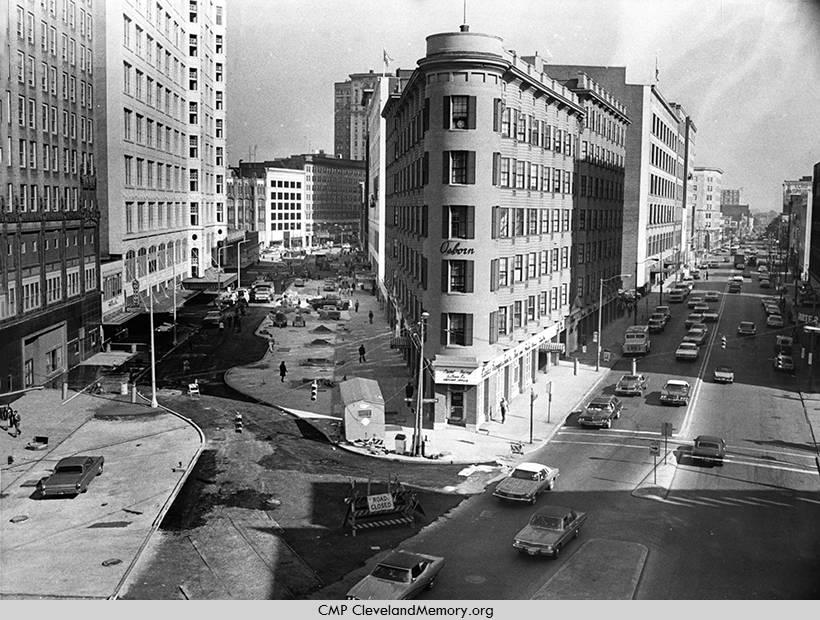
At left, Huron Road was converted in 1973 into a mostly pedestrian-oriented right of way, east of Prospect Avenue, so the Halle’s Department Store and other nearby businesses could compete better for visitors with their suburban counterparts. It didn’t work and most of the street right of way was restored to car traffic in the 1980s (Michael Schwartz Library, Cleveland State University).
The survey asks “Would the Huron street closure affect your daily commute? Would the street closure negatively effect (sic) your experience of living or working at your building? What are your thoughts positive or negative to the possible road closure?”
Huron was partially closed to vehicles starting in 1973 during the nationwide pedestrian mall craze in an effort to promote downtown businesses. Among the champions of Huron’s closure was the Halle Brothers Co. department store which actually had two retail buildings on either side of Huron but later closed the south building and converted it into a parking garage. The Halle’s chain of stores, including the downtown location, closed in 1982. The two-way street was soon restored.
The differences to today are significant. First, downtown has five times as many residents, growing past 20,000 people. Second, Playhouse Square has become a major attraction. By the 1970s, most of the theaters had closed. The fledgling Playhouse Square Foundation was just starting to save the theater district’s five major theaters from demolition. And it’s adding smaller venues which could soon include a repurposing of the Greyhound Station.
Also, the Gateway sports and entertainment complexes were still two decades away. In 1974, the Cleveland Cavaliers basketball team moved from the Cleveland Arena on Euclid at East 36th Street to the new Richfield Coliseum, 20 miles from downtown. The then-Cleveland Indians, now Guardians, played baseball at old Cleveland Municipal Stadium on downtown’s lakefront — more than a one-mile walk down East 9th Street.
END

